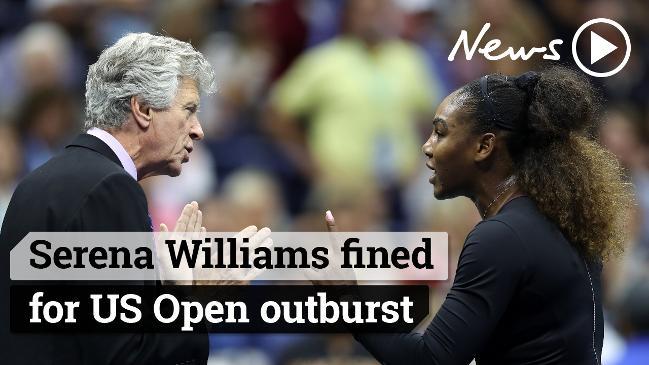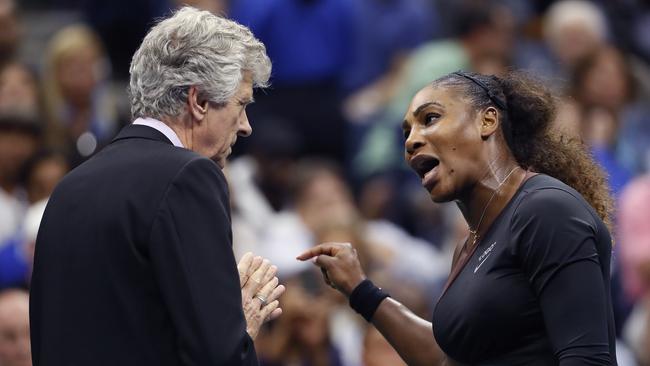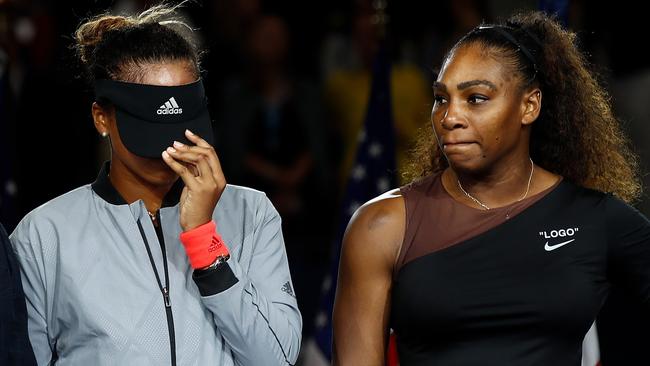Feminists using bullying accusations as power play
SERENA Williams’ real target was not the male umpire, it was her female opponent, Naomi Osaka. She pulled the ultimate mean girl move, and yet still played the gender card, writes Miranda Devine.

Rendezview
Don't miss out on the headlines from Rendezview. Followed categories will be added to My News.
SERENA Williams and her army of feminist enablers can play the gender card as hard as they like, but everyone else who watched her behaviour at the US Open Final knew exactly what they were seeing.
A bully. A shrieking, shouting, emotionally incontinent bully wagging her finger at the umpire, eliciting boos and jeers from the mob, abusing her position as the most powerful women in tennis.
And all because she was losing the game. She was down 6-2 in the first set against a younger, faster female opponent, Japan’s Naomi Osaka, 20, and lost the second set 6-4.
Serena, 36, accused umpire Carlos Ramos of “stealing” from her when he penalised her because her coach was coaching from the sidelines, which he admitted, because she smashed her racquet on the ground and because she abused him.
“I have a daughter,” she wailed. What kind of a role model is a mother who tantrums like a spoiled brat in public?

Worst of all was Serena’s attempt to play the gender card, accusing umpire Carlos Ramos of sexism and claiming men aren’t treated so harshly, as if John McEnroe wasn’t once thrown out of a match after abusing a line judge.
Criticism of her behaviour, even a cartoon depicting her as a toddler having a tantrum, is dismissed as sexism or racism, which just gives her a licence to bully some more.
She’s been getting away with it all her career. Almost a decade ago at the US Open after being called for a foot fault, she was recorded screaming at the line judge: “I swear to God I’m f**king going to take this f**king ball and shove it down your f**king throat, you hear that?”
No consequences then. None now.
That doesn’t make a champion. It makes a monster.
Imagine if she were a man and the umpire a woman. Let alone swap the skin colours. He’d be hung, drawn, and quartered.
What actually is sexist and racist, is making excuses, on the basis of her sex and skin colour, for behaviour that would not be excused in anyone else. That implies that women, or black women, lack the emotional control to deal with adversity and treat umpires with courtesy.
This is the poison of identity politics, which forces people into competing victim groups according to superficial qualities such as race and gender and ends up insulting and infantilising the very people it purports to protect.
But if you’ve read a book, or lived a life, you will recognise what we saw at Flushing Meadows on the weekend as pure, full throated bullying, practised by an expert. Mean, aggressive, out of control.

And then Serena had the hide to cast herself as a feminist martyr: “I’m going to continue to fight for women,” she said at her press conference after the match. “I just feel like the fact that I have to go through this is just an example for the next person that has emotions, and that want to express themselves, and want to be a strong woman.”
This is a classic tactic of bullies, to turn the tables on their victims by claiming to be the victim themselves.
Accusations of bullying have become a feminist weapon to gain power.
We’re seeing it in Canberra, from female Liberal MPs who complain they were bullied during the latest coup, with the implication that men were the perpetrators. Of course, without specific allegations, we don’t know what exactly happened to these women, so dismissing their complaints would be unwise.
But it sets a terrible example to perpetrate the myth that women are always the victims and men always the bullies. It allows men and women who bully men and women who bully women to get away with it. Pretending bullying is purely a male disorder does a disservice to the victims of female bullies.
You just had to watch the ABC’s Q&A high school special this week to see how entrenched that myth is, with one female student claiming that having more women in parliament would fix the problem of bullying.
In her dreams. It would just change the nature of bullying.
The worst bullies I’ve ever known are women. Men’s bullying at least is out in the open and easier to call out.
With women bullies, it’s covert and difficult to report. Victims are often “gaslighted” — or made to doubt their own perceptions of reality.
According to the US Workplace Bullying Institute, of the 40 per cent of bullies who are women, almost three quarters pick on other women.
Female bullies use sophisticated techniques of social aggression honed from early years in the playground, such as “excluding, ignoring, teasing, gossiping, secrets, backstabbing, rumour spreading and hostile body language [such as] eye-rolling and smirking,“ writes Dr Ditta Oliker in Psychology Today.
Serena Williams’s real target was not the male umpire. It was her female opponent, Osaka. To her credit, Osaka wasn’t put off her game.
But the intimidation took its toll and she dissolved in tears on the winner’s podium. In what should have been her proudest moment she had to pull her cap over her face to hide her distress as Serena’s fans booed and jeered. And then she apologised for winning.
Serena accused the umpire of stealing the game from her. But it was Serena who stole Osaka’s joy at winning her first Grand Slam title.
She is nothing but an entitled bully, the ultimate mean girl. Every workplace has them. Time to call it out.



